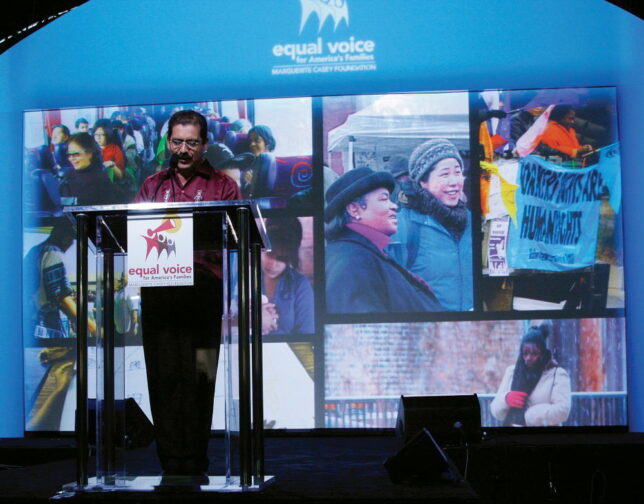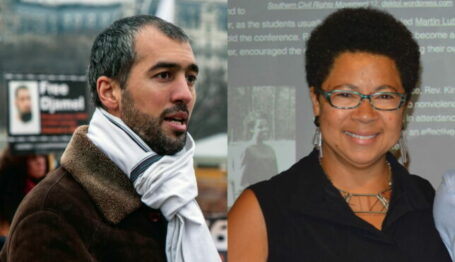Foundation Watch
The Marguerite Casey Foundation: A Focus on Group Identity
Big Philanthropy’s Most Radical Foundation?
 The Freedom Scholars awards reflect what the foundation calls its “commitment to scholarship benefitting movements led by Black and Indigenous people, migrants and queer people, poor people, and people of color.” Credit: caseygrants. License: https://shorturl.at/auvL2.
The Freedom Scholars awards reflect what the foundation calls its “commitment to scholarship benefitting movements led by Black and Indigenous people, migrants and queer people, poor people, and people of color.” Credit: caseygrants. License: https://shorturl.at/auvL2.

The Marguerite Casey Foundation: Big Philanthropy’s Most Radical Foundation? (full series)
“Social Justice Philanthropy” | A Focus on Group Identity
Left-Wing Grantmaking | Thoughts and Questions
A Focus on Group Identity
The most consistent theme running through the Marguerite Casey Foundation’s activities is a central focus on group identity—chiefly race and ethnicity, but also immigration status, sexual orientation, and more—which it mixes in with a healthy dose of socialist economics and class consciousness. Indeed, such human characteristics, which are often immutable, appear central to the foundation’s worldview. Dividing society along such lines for the purpose of fashioning socioeconomic public policy is perhaps its core identifiable operational priority.
For a concise illustration of the foundation’s ideological bent, consider its official book club. It is featured prominently on its website and promotes works that “encourage us to imagine how we can radically transform our democracy, economy, and society.” Representative titles include:
- Let This Radicalize You: Organizing and the Revolution of Reciprocal Care, by Kelly Hayes and Mariame Kaba.
- Community as Rebellion: A Syllabus for Surviving Academia as a Woman of Color, by Lorgia Garcia Pena.
- Feminism. Now., by Angela Davis, Gina Dent, Erica R. Meiners, and Beth E. Richie.
- Becoming Abolitionists: Police, Protests, and the Pursuit of Freedom by Derecka Purnell.
- From #BlackLivesMatter to Black Liberation, by Keeanga-Yamahtta Taylor.
- The Whiteness of Wealth: How the Tax System Impoverishes Black Americans-and How We Can Fix It, by Dorothy A. Brown.
- Tip of the Spear: Black Radicalism, Prison Repression, and the Long Attica Revolt, by Orisanmi Burton.
- Our History Has Always Been Contraband: In Defense of Black Studies, edited by Colin Kaepernick, Robin D.G. Kelley, and Keeanga-Yamahtta Taylor.
In 2020, the Marguerite Casey Foundation started a major new grantmaking program called Freedom Scholars, through which it awards unrestricted $250,000 lump sums to left-wing activist-academics whom the foundation considers to be “social justice leaders.” The awards reflect what the foundation calls its “commitment to scholarship benefitting movements led by Black and Indigenous people, migrants and queer people, poor people, and people of color.” The program is invitation-only, and 34 Freedom Scholar grants have been awarded through 2023.
Each awardee’s profile on the foundation’s website includes a paragraph or two about their academic work, along with a quote. Every single one makes at least some reference to race or ethnicity. Almost half include some variation of the word “politics,” while more than a third feature some variation of the word “abolition.” Ten include the word “radical,” 10 include some variation of the word “incarceration,” and eight include some variation of the word “colonial.” The profiles of two recipients highlight their professional associations with Marxism, while another two specifically mention their work with the far-left Movement for Black Lives. One of the inaugural 2020 class of Freedom Scholars—Ramzi Kassem—was subsequently (and controversially) hired as an immigration policy advisor in the Biden Administration.
The 2023 Freedom Scholars include Charmaine Chua, whose work “confront[s] the global regimes of production and distribution that configure race and class inequalities, with a focus on how these inequalities are lived, contested, and overcome by anti-imperialist, anticapitalist, and abolitionist freedom struggles.” Mimi E. Kim, another 2023 awardee, works “at the intersections of racial and gender justice, abolition, and social movements,” examining “the historical development of carceral feminism,” while Dayo F. Gore studies activists who have “engaged, taken up, and negotiated the intersecting forces of race, gender, sexuality, and class in their organizing and theorizing.”
Even programs that are directed at full-scale socioeconomic transformation are rooted in the foundation’s focus on race. In 2023, the Marguerite Casey Foundation announced a new Public Dollars for Public Good initiative, which aims to “build the unfulfilled promise of vibrant multiracial democracy.” It largely grew out of the 2020 Black Lives Matter protests and associated calls to defund the police, with Rojas stating that “if the summer of 2020 taught us anything, it’s that those [funds for policing] were public dollars for public bad, like the use of public dollars to oppress people, to isolate people, to kill people.” She accused Americans of blaming the poor for “the failures of our economy and the failures of our government to actually help them meet their needs,” adding that “I think for most intents and purposes, it’s racism.”
The Public Dollars for Public Good campaign aims for nothing less than a sea change in the role of government in Americans’ lives—slashing law enforcement budgets while “increasing people’s expectations and demands for public goods and public options” to supplant the private sector and a supposedly malevolent “network of free market capitalists.” To Rojas, the campaign reflects philanthropy’s “critical role” in supporting efforts “to wrest control of public funds away from wealthy elites and large corporations, return the power of the purse to the general public, and fuel local and national movements to abolish poverty through significant and sustained investments in public institutions.” In other words, Rojas wants foundations to bankroll a full-on socialist transformation in the United States.
The initial batch of Public Dollars for Public Good grantees includes the Economic Security Project, which supports universal basic income; KC Tenants, which has endorsed the socialization of large swaths of America’s housing sector; and Seattle Solidarity Budget, which wants the eponymous city’s government to defund law enforcement and guarantee income, housing, food, transportation, and more to all of its residents. The Public Dollars for Public Good campaign has eight official advisors, including three (Pronita Gupta, Sameera Fazili, and K. Sabeel Rahman) who previously served in the Biden Administration, and a fourth (David Weil), who was nominated but failed to secure Senate confirmation.
Finally, identity-based “diversity” is central even to decisions concerning the Marguerite Casey Foundation’s rather large endowment. One of the great ironies common to many left-wing anti-capitalist private foundations is not only that they were established through the fruits of capitalistic business success, but also that their perpetuation often depends upon some of the most thoroughly capitalist investment products imaginable. The Marguerite Casey Foundation’s endowment has $379 million invested in corporate stock, $113 million invested in corporate bonds, and $304 million invested in an array of specialized real estate, private equity, and venture capital funds.
Even while collecting its capitalist largesse, however, the Marguerite Casey Foundation still attempts to use its endowment to further its leftist mission, such as through making investments according to environmental, social, and corporate governance (ESG), supporting ESG shareholder resolutions, and publicly calling on major asset managers to consider the alleged impacts of “systemic racial inequalities on long-term value creation” when making their own proxy vote decisions. The foundation’s official investment policy also aims to incorporate “a racial justice lens across asset classes and investment types” and sets an explicit goal of having more than half of its endowment “overseen by diverse managers by the end of 2025.”
In the next installment, the foundation’s approach often appears openly political and focused on achieving electoral outcomes.



